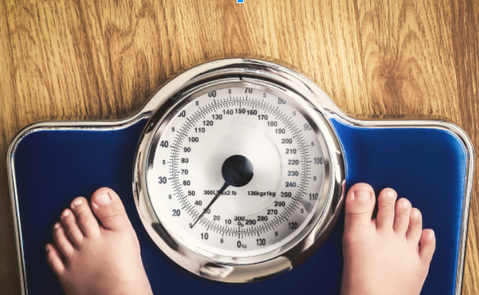 Share on Facebook
Share on Facebook
 What exactly is obesity? Is it just having a little tummy fat? And what are the risks associated with obesity? And how can you combat it? We lay out everything you need to know
What exactly is obesity? Is it just having a little tummy fat? And what are the risks associated with obesity? And how can you combat it? We lay out everything you need to know
It’s common knowledge that the obesity rates and trends in the United States are grim. So grim, in fact, that according to the Centers for Disease and Control Prevention, more than one-third of U.S. adults are dealing with obesity (that’s about 36.5 percent of adults in america).
Even worse, the national childhood obesity rate is a whopping 18.5 percent. This includes a breakdown of rates at about:
- 13.9 percent of children 2-to-5
- 18.4 percent of 6-to-11
- 20.6 percent for 12-to-19
As a nation, the United States is aware that obesity is a mega-problem in our country, but many people, both obese and not, are left with plenty of unanswered questions about the condition.
For example, what does being obese actually mean? What constitutes obesity and how can you know if you’re dealing with the risks associated with being obese? Is being overweight different than being obese?
Further, what are the risks that go hand-in-hand with obesity. Does it mean your heart is less healthy? Does it mean that you’re facing the possibility of a shorter life?
More importantly, how can you combat obesity and what are the best ways to treat it? How can a person fight obesity and the risk that are associated with it?
We’re here to break it down for you. Read our guide below answers to any questions you might have about obesity, tips for how to treat and fight obesity, and even more helpful information that you might be unaware of.
What Constitutes Obesity?
When it comes down to actually defining obesity, a lot of people have a fuzzy idea on where they fall within that category. An overweight person, for example, doesn’t necessarily qualify as an obese person, but often, people will interchange these two terms.
Are you obese if you have a little extra belly fat? Likely, this is not the case. Are you obese if your clothes are fitting a little tighter than usual?
Being overweight and being obese are two different conditions. Determining obesity has a lot to do with what’s known as the Body Mass Index, which is a statistical measurement that’s derived from your height and weight. Typically, if your BMI is between 25 and 29.9, you’re considered overweight, and if your BMI is 30 or over, you’re likely considered obese.
It’s important to note, though, that BMI can be misleading. For the average person, the BMI will work fine, but the BMI indicator will not measure your body fat percentage. Someone who is incredibly muscular for their height will have a higher weight, but a lot more muscle than fat.
They might have a higher-than-normal BMI, but that doesn’t mean that they’re obese. According to the CDC, there are a different classes of obesity, too:
- Class 1 is a BMI of 30 - 34
- Class 2 includes BMIs of 35 to 39
- Class 3 includes ranges of 40 and higher.
One of the simplest ways to define obesity is a condition in which a person has accumulated enough body fat that will have a negative effect on their health. When it comes down to it, the best way to determine obesity is to have a direct, frank talk with your doctor about your weight.
 The Risks of Obesity
The Risks of Obesity
Unfortunately, being obese is far more than just a cosmetic issue - it’s a verified, guaranteed health hazard and can, without a doubt, shorten your lifespan, lower your quality of life, and present real, threatening health issues.
Someone is obese is twice as likely to die prematurely than an average-weight person. It’s unlikely that you’ll meet a doctor who won’t agree that an obese person is more likely to have health issues, too.
An obese person faces both general and specific health risks. If you are obese, your entire body will feel it. Your heart, your joints, your blood pressure, your blood sugar -- all of your systems are going to have to work harder to support you and keep you running like normal, often resulting in serious or chronic issues.
Additionally, the extra fat cells your body is carrying around will likely produce inflammation and various hormones which can also contribute to chronic medical conditions.
Obese people have a much higher risk of dealing with life-threatening issues like heart disease, strokes, high blood pressure, and high blood sugar. Because of the excess weight and body fat, an obese person’s heart will have to work overtime to support them, putting extra strain on their system.
Further, you’re at a much greater risk of other conditions like diabetes (a condition where your body’s ability to respond to or produce insulin is impaired, resulting in an abnormal metabolism of glucose), gallstones, cancer, osteoarthritis, and gout.
Certain facets of life will also be more difficult when you’re obese. Simple things like sleeping can be strongly affected when you’re dealing with obesity. Those who are dealing with obesity, are prone to breathing issues such as sleep apnea, where a person stops breathing for a short time during sleep.
 Strategies for Reducing Obesity
Strategies for Reducing Obesity
It might seem like the odds are stacked against you, but don’t panic. There are small ways to start attacking these obstacles and battling obesity. To understand how to combat obesity, it’s important to understand what causes obesity in the first place.
One of the biggest causes of obesity is simple: consuming too many calories. People are unaware that the amount of food they’re consuming (and the types of food they’re consuming) are contributing to their weight gain.
To combat this, you must have a thorough idea on what you’re eating, how many calories are in it, and how it fuels your body.
Consider eating more fruits and vegetables, cutting out certain foods that don’t serve your body (sodas and foods high in fat content). Additionally, try to work with your doctor to get a strict grasp on what you should be eating, specific meal plans, what foods you should be cutting out.
Additionally, obesity is common when someone leads a sedentary lifestyle. The less you move around, the fewer calories you burn. That, combined with overindulging on your calories, can lead to rapid weight gain. But it’s not only about the calories.
Moving around, and physical activity in general, have a huge effect on how your hormones work, and often, those hormones have a huge effect on how your body processes and digests food.
Studies indicate that physical activity has a beneficial effect on insulin levels and are more likely help keep them stable. A sedentary life spent sitting still or in front of a television can easily lead to unwanted pounds, so to combat this, try incorporating movement and physical activity into your daily life.
Start small, shooting for about 30 minutes of cardio-intensive activity every day. Talk with your doctor about gradually increasing your physical activity and discuss what kind of activities might best benefit you.
Instead of driving the half-mile to work, take a walk! Swap out an hour of TV time for an hour on your bike. There are plenty of options for a more active lifestyle!
Many people aren’t aware, but sleep is also huge factor when it comes to maintaining a healthy weight. Research suggests that people who don’t sleep enough have double the risk of becoming obese than those who do.
A study from The University of Warwick stated that sleep deprivation could lead to obesity because of the increased appetite people have as a result of hormonal changes. In layman’s terms, if you don’t sleep enough, you’re going to produce more Ghrelin (a hormone that stimulates your appetite) and less leptin (a hormone that suppresses your appetite).
To combat this? It’s simple! Get more sleep. Make getting your 8 hours an absolute must. Not only will you feel far more rested, you won’t run the risk of overproducing Ghrelin or increasing your appetite because of your lack of sleep.
Finally, a lack of familiarity or awareness about factors that could affect your weight - hormonal imbalances, digestive issues, medications, endocrine disruptors, and even smoking - can play a significant role in obesity.
Determining any genetic issues your body might have, discussing digestive or hormonal imbalances that could cause you to gain weight, and discussing all of your medicines with your doctor is one of the first steps toward combating obesity.
Overall, the key steps toward combating obesity revolve around making the choice to eat a healthy, nutritious, and calorically-appropriate diet, working at maintaining an active lifestyle, getting enough sleep, and working with your doctor to determine any genetic, medicinal, hormonal, or digestive imbalances that could cause weight gain.
Obesity: Final Thoughts
The risks of obesity go far past any sort of physical appearance or cosmetic ideal. The simple truth is, being obese puts people at much bigger health risks and can, ultimately, lead to a much shorter life.
Obesity is a dangerous condition that’s plaguing the United States, and unfortunately, it’s a slippery slope. Simple parts of your lifestyle can build up, and if you’re not careful, your sedentary way-of-living, over-indulgence of calories, lack of sleep, or ignorance about your personal metabolism issues could lead to an obesity condition.
Don’t let obesity ruin your life. Make changes today. Your body will thank you.
SOURCE: https://doublewoodsupplements.com/pages/obesity-what-it-really-is-the-risks-and-how-to-combat-it


